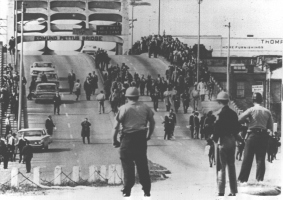There is an interesting exchange from Joe Klein's The Natural, a mini-memoir of the Clinton era, in which a Republican senator confesses to President Clinton that Republicans "don't believe in Government very much, but we love power." That is a good starting point for understanding the judicial activism of the Roberts Court and its decision in Shelby County v. Holder invalidating portions of the Voting Rights Act.
Four years earlier, Chief Justice Roberts engineered the Court's Citizens United decision, pushing it from a narrow decision that was consistent with prior election law jurisprudence to instead, in the words of former Senator Russ Feingold, "roll back laws that have limited the role of corporate money in federal elections since Teddy Roosevelt was president."

Congress passed the Voting Rights Act in 1965 in reaction to "Bloody Sunday" when voting rights marchers were blocked and clubbed by the state police on Selma, Alabama's Edmund Pettus Bridge. The Act requires jurisdictions having a history of voting discrimination to submit election law changes for preclearance review by the Justice Department pursuant to authority granted Congress under the 15th amendment (providing that the right of citizens of the United States to vote shall not be denied or abridged . . . on account of race").
Congress reauthorized the Act in 1982 and again in 2006, following 21 hearings and a legislative record that exceeded 15,000 pages. Among the findings was that between the 1982 reauthorization and 2006, the number of Justice Department pre-clearance objections jumped 180 percent, with the nature of the restrictions being more subtle but still driven by the intent to restrict minority voting power. The 2006 reauthorization was approved by the House 390-33 and Senate 98-0, with Shelby County, Alabama's two senators and congressman each voting in favor.
In 2010, Shelby County filed a constitutional challenge to the Voting Rights Act, claiming that the preclearance procedure was unconstitutional, an argument rejected by the District Court and Court of Appeals. Three days after President Obama won reelection in large part due to a huge turnout among African Americans, the Roberts' Court decided to hear this case.
In writing for the majority, Roberts seemed to forget his own admonition from only a year ago that courts "must presume an Act of Congress is constitutional unless the lack of constitutional authority ... is clearly demonstrated" and that a "heavy burden rests on those who would attack the judgment of the representatives of the people."
Roberts offered no such deference, glossing over (i) Congressional findings from the 2006 reauthorization; (ii) the fact that a number of Republican controlled states, including eight of eleven states in the former Confederacy, passed new voting restrictions since the 2010 election having the effect of reducing minority vote; (iii) the outcry over Florida Governor Scott's substantially curtailing voting hours and machines in 2012, creating lines lasting several hours in minority districts; or (iv) the Republican Party's willingness to consider further voting restrictions following President Obama's reelection.
With respect to Alabama in particular, Roberts ignored a 2010 FBI sting in which members of the Alabama legislature were caught on tape referring to African-Americans as "aboriginals" and announcing their intention to suppress their vote.
Instead, Roberts supplanted Congressional findings with his own view that increased black voter registration and turnout were a sign that the law was working so as to not require pre-clearance, when the success he cited no doubt was achieved as a result of the presence and exercise of pre-clearance procedures.
In doing so, Roberts gave Republicans reeling from a shrinking base a lifeline. The lifeline, however, may turn out to be a noose, since if Republicans block an attempt to amend the Voting Rights Act it could cement perceptions that the party (and even the Roberts court) is too extreme.
Secondly, minority voters understand what is really going on here. I was part of the Obama legal protection effort in Florida during the last election and recall going to a polling station in Miramar to encourage voters to remain in line for almost four hours, only to find little coaxing was needed. They knew why they were in line and like their forefathers in Selma, who responded to Bloody Sunday by returning to the same bridge days later, they were not "going to let anybody turn them around."
Roberts' Shelby County power play may only make them more determined to fight for their right to vote. It is a tragedy, however, that as we approach the 50th anniversary of Selma, the Chief Justice is comfortable with an America where they still have to.
